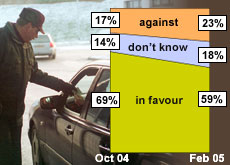Support for Schengen slips as vote draws closer

The number of Swiss who support closer cooperation on security and asylum with the European Union has fallen, a survey has found.
But the third poll to date on whether Switzerland should sign up to the EU’s Schengen/Dublin accords shows that 59 per cent of voters are still in favour.
The electorate is likely to have the final say on joining Schengen/Dublin because the rightwing Swiss People’s Party is expected to collect enough signatures by the end of the month to force a nationwide vote in June.
Support for the treaty was highest last October when 69 per cent of those polled by the GfS Bern research and polling institute said they would vote in favour.
The latest poll, commissioned by the Swiss Broadcasting Corporation, shows support has dropped substantially since parliament decided in December to ratify Schengen/Dublin. The treaties are part of a package of nine bilateral accords between Switzerland and the EU.
The same poll found that just under a quarter of the electorate is against Switzerland’s participation, a rise from 12 per cent since the first survey last August.
Undecided
Eighteen per cent of respondents remain undecided three months before a possible vote.
“People are obviously leaning towards Schengen/Dublin,” said GfS director Claude Longchamp.
Backing for the treaties is strongest among supporters of the centre-right Radicals and the centre-left Social Democrats, 80 per cent of whom say they would vote in favour of the two treaties.
The centre-right Christian Democrats are somewhat less enthusiastic, with 62 per cent backing the accords, while some two-thirds of People’s Party supporters are against Schengen/Dublin.
“People do seem generally to be more sceptical of these accords,” Longchamp told swissinfo.
Differences
Those most opposed to the treaties are people who have not attended university. No major differences are apparent among the language regions. Usually French-speaking areas tend to be keen on closer ties with Europe than do the German- and Italian-speaking regions.
According to GfS, the results of the survey show that a vote could go either way in June. It will come down to which side “sells” their position best, says Longchamp.
“So far, we have seen no decisive argument,” he added, saying the debate will likely boil down to a choice between national sovereignty and security.
Labour market
Another GfS poll shows that voters remain largely in favour of opening the Swiss labour market to the new EU member states.
That accord is already in force between Switzerland and the “old” 15 EU members, and the Swiss electorate is expected to vote in September on whether to extend it to the ten newer EU member states.
One third of those surveyed said they would vote against the extension, while just over half would say “yes”.
Longchamp says the government made the right decision in setting the date for the Schengen/Dublin vote before the poll on the free movement of workers.
“It would have made things difficult if people had voted on the more controversial free movement issue before the security treaties,” he said. “There can be no doubt that the first vote will determine the outcome of the other.”
swissinfo, Christian Raaflaub
59 per cent of those polled are in favour of the Schengen and Dublin accords.
23 per cent are against.
18 per cent are undecided.
Expected voter turnout: 46 per cent.
The survey was carried out between February 21 and February 26.
1,211 people were polled all over the country.
The margin of error is 3.2 per cent.
Schengen includes measures to lift border controls and improve cross-border security.
Dublin concerns asylum. In the EU, asylum seekers can file a request for asylum in one country only.

In compliance with the JTI standards
More: SWI swissinfo.ch certified by the Journalism Trust Initiative












You can find an overview of ongoing debates with our journalists here . Please join us!
If you want to start a conversation about a topic raised in this article or want to report factual errors, email us at english@swissinfo.ch.